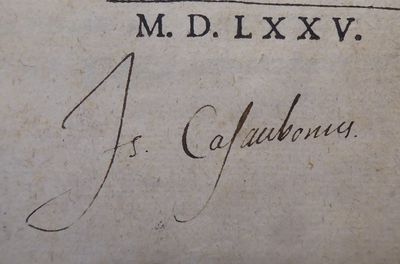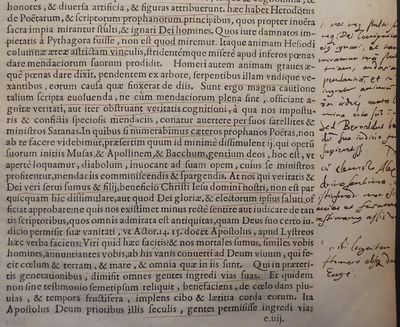Difference between revisions of "Isaac Casaubon 1559-1614"
| (5 intermediate revisions by the same user not shown) | |||
| Line 4: | Line 4: | ||
====Biographical Note==== | ====Biographical Note==== | ||
Born at [[place of birth::Geneva]], son of [[family::Arnaud Casaubon]], [[occupation::pastor]] in the reformed church there. He attended the [[education::University of Geneva]], where he was appointed [[occupation::professor]] of Greek in 1582. Soon afterwards he began publishing what became a long series of scholarly editions of classical authors which established his reputation as one of the foremost European scholars of his generation. He moved to the [[organisations::University of Montpellier]] in 1596 and to [[location::Paris]] in 1600 (he became [[occupation::keeper]] of the royal library there in 1605). The French political climate became increasingly hostile to protestants, and in 1610 he accepted an invitation to move to [[location::London]], where he became acquainted with many leading churchmen and academics, and was encouraged by [[crossreference::James VI and I|James I]]. He was made a [[occupation::prebendary]] of [[organisations::Canterbury Cathedral|Canterbury]] and given a state pension, but while his final years continued to be productive, he lamented the more restricted access to books in England (he had to leave part of his library in Paris), and his classical philological work was largely replaced by writing contributions to the doctrinal controversy between the Roman church and the Church of England. | Born at [[place of birth::Geneva]], son of [[family::Arnaud Casaubon]], [[occupation::pastor]] in the reformed church there. He attended the [[education::University of Geneva]], where he was appointed [[occupation::professor]] of Greek in 1582. Soon afterwards he began publishing what became a long series of scholarly editions of classical authors which established his reputation as one of the foremost European scholars of his generation. He moved to the [[organisations::University of Montpellier]] in 1596 and to [[location::Paris]] in 1600 (he became [[occupation::keeper]] of the royal library there in 1605). The French political climate became increasingly hostile to protestants, and in 1610 he accepted an invitation to move to [[location::London]], where he became acquainted with many leading churchmen and academics, and was encouraged by [[crossreference::James VI and I|James I]]. He was made a [[occupation::prebendary]] of [[organisations::Canterbury Cathedral|Canterbury]] and given a state pension, but while his final years continued to be productive, he lamented the more restricted access to books in England (he had to leave part of his library in Paris), and his classical philological work was largely replaced by writing contributions to the doctrinal controversy between the Roman church and the Church of England. | ||
| + | [[file:P1270719(1).JPG|thumb|400px|Casaubon's inscription, from British Library C.79.e.12, M. Beroaldus, ''Chronicum'', 1575]] | ||
====Books==== | ====Books==== | ||
Casaubon was a keen acquirer of books, to support his scholarly work, throughout his life. An inventory made at the time of his move from [[location::Geneva]] to [[location::Montpellier]] in 1596 shows that he then had around 500 volumes. When he moved to [[location::London]] in 1610, he brought some, but not all, his books with him; by the time of his death, he had ca.1200 volumes in London, while ca.850 remained in [[location::Paris]]. They were gradually dispersed, from then onwards; many were retained by his widow and son [[crossreference::Meric Casaubon|Meric]] (who also brought some of the Paris books over to England), but the value of Casaubon's books, for both contents and annotations, was quickly recognised. Many books were bought for the Royal Library soon after Casaubon's death (and are therefore now in the [[organisations::British Library]]). 61 volumes of his adversaria were bequeathed to the [[organisations::Bodleian Library]] by [[crossreference::Meric Casaubon|Meric]] in 1671. Edward Bernard’s ''Catalogi manuscriptorum'', 1697, lists 110 [[format::manuscripts]] which belonged to Casaubon. Around a fifth of his total library is thought to be traceable today. | Casaubon was a keen acquirer of books, to support his scholarly work, throughout his life. An inventory made at the time of his move from [[location::Geneva]] to [[location::Montpellier]] in 1596 shows that he then had around 500 volumes. When he moved to [[location::London]] in 1610, he brought some, but not all, his books with him; by the time of his death, he had ca.1200 volumes in London, while ca.850 remained in [[location::Paris]]. They were gradually dispersed, from then onwards; many were retained by his widow and son [[crossreference::Meric Casaubon|Meric]] (who also brought some of the Paris books over to England), but the value of Casaubon's books, for both contents and annotations, was quickly recognised. Many books were bought for the Royal Library soon after Casaubon's death (and are therefore now in the [[organisations::British Library]]). 61 volumes of his adversaria were bequeathed to the [[organisations::Bodleian Library]] by [[crossreference::Meric Casaubon|Meric]] in 1671. Edward Bernard’s ''Catalogi manuscriptorum'', 1697, lists 110 [[format::manuscripts]] which belonged to Casaubon. Around a fifth of his total library is thought to be traceable today. | ||
| − | + | [[file:P1270721(1).JPG|thumb|400px|Casaubon's cropped annotations, and textual underlining, from the same British Library book]] | |
====Characteristic Markings==== | ====Characteristic Markings==== | ||
Casaubon regularly inscribed his name on his titlepages, "Is. Casaubonus" or similar. He often annotated his books extensively. | Casaubon regularly inscribed his name on his titlepages, "Is. Casaubonus" or similar. He often annotated his books extensively. | ||
| Line 24: | Line 25: | ||
{{DEFAULTSORT:Casaubon, Isaac}} | {{DEFAULTSORT:Casaubon, Isaac}} | ||
[[Category:Clergy]] | [[Category:Clergy]] | ||
| + | [[Category:Academics]] | ||
[[Category:Canons]] | [[Category:Canons]] | ||
[[Category:Marginalia and Annotations]] | [[Category:Marginalia and Annotations]] | ||
[[Category:Libraries Bequeathed to Institutions]] | [[Category:Libraries Bequeathed to Institutions]] | ||
| − | |||
[[Category:All Owners]] | [[Category:All Owners]] | ||
Latest revision as of 08:31, 21 April 2022
Isaac CASAUBON 1559-1614
Biographical Note
Born at Geneva, son of Arnaud Casaubon, pastor in the reformed church there. He attended the University of Geneva, where he was appointed professor of Greek in 1582. Soon afterwards he began publishing what became a long series of scholarly editions of classical authors which established his reputation as one of the foremost European scholars of his generation. He moved to the University of Montpellier in 1596 and to Paris in 1600 (he became keeper of the royal library there in 1605). The French political climate became increasingly hostile to protestants, and in 1610 he accepted an invitation to move to London, where he became acquainted with many leading churchmen and academics, and was encouraged by James I. He was made a prebendary of Canterbury and given a state pension, but while his final years continued to be productive, he lamented the more restricted access to books in England (he had to leave part of his library in Paris), and his classical philological work was largely replaced by writing contributions to the doctrinal controversy between the Roman church and the Church of England.
Books
Casaubon was a keen acquirer of books, to support his scholarly work, throughout his life. An inventory made at the time of his move from Geneva to Montpellier in 1596 shows that he then had around 500 volumes. When he moved to London in 1610, he brought some, but not all, his books with him; by the time of his death, he had ca.1200 volumes in London, while ca.850 remained in Paris. They were gradually dispersed, from then onwards; many were retained by his widow and son Meric (who also brought some of the Paris books over to England), but the value of Casaubon's books, for both contents and annotations, was quickly recognised. Many books were bought for the Royal Library soon after Casaubon's death (and are therefore now in the British Library). 61 volumes of his adversaria were bequeathed to the Bodleian Library by Meric in 1671. Edward Bernard’s Catalogi manuscriptorum, 1697, lists 110 manuscripts which belonged to Casaubon. Around a fifth of his total library is thought to be traceable today.
Characteristic Markings
Casaubon regularly inscribed his name on his titlepages, "Is. Casaubonus" or similar. He often annotated his books extensively.
Sources
- Birrell, T., The reconstruction of the library of Isaac Casaubon, Hellinga festschrift, Amsterdam, 1980, 59-68.
- Considine, John. '"Casaubon, Isaac (1559–1614), classical scholar and ecclesiastical historian."' Oxford Dictionary of National Biography.
- Craster, H., Casaubon's Greek manuscripts, Bodleian Library Quarterly 5 (1926), 97-100.
- Grafton, A. and Weinberg, J., Isaac Casaubon’s library of Hebrew books, in G. Mandelbrote and B. Taylor (eds), Libraries within the library, London, 2009, 24-42.
- Macray, W., Annals of the Bodleian Library, 2nd edn, Oxford, 1890, p.136.

